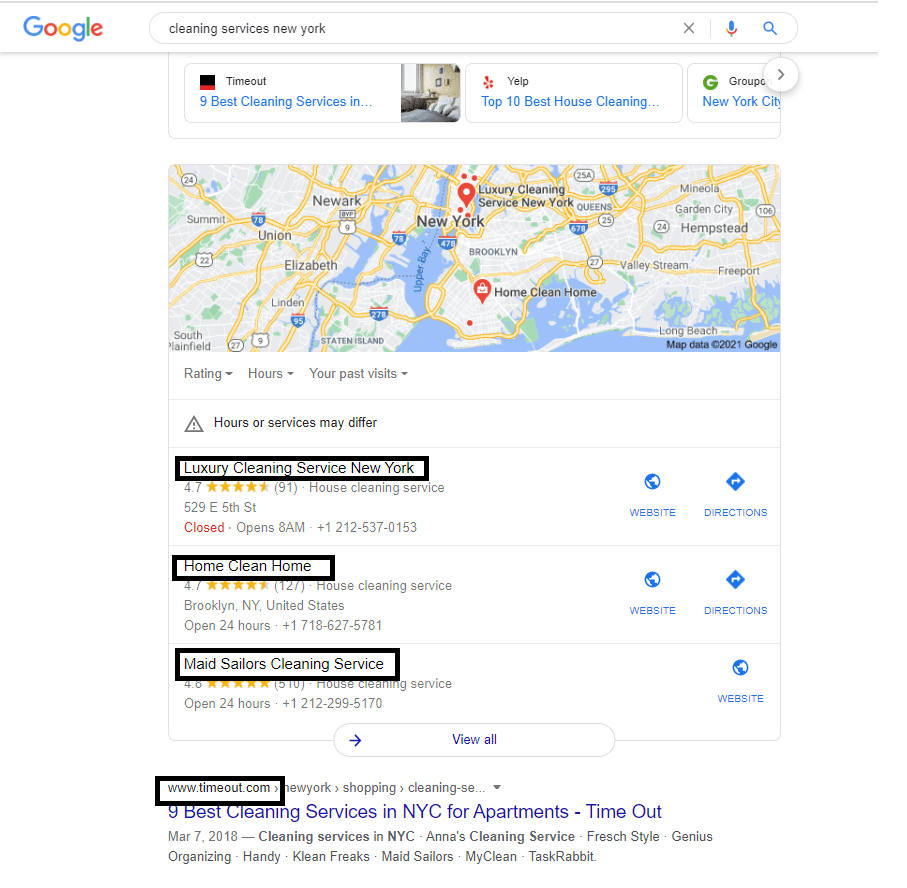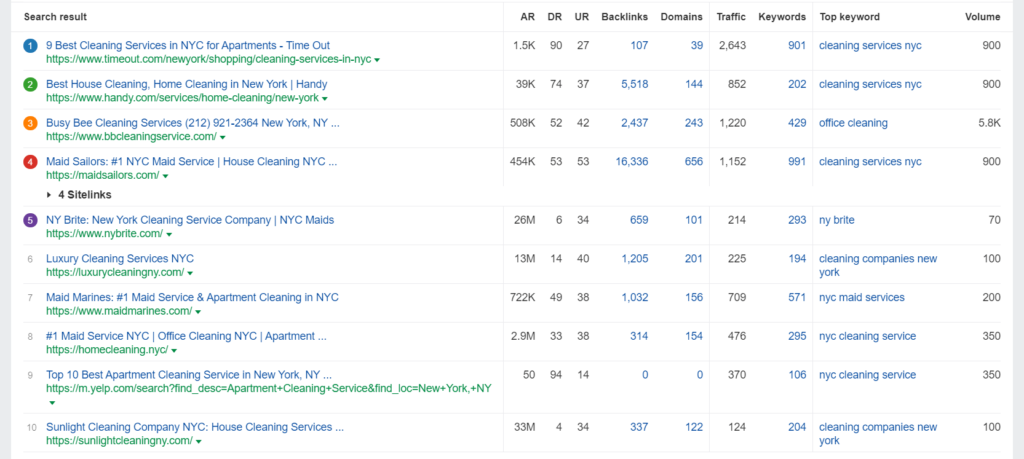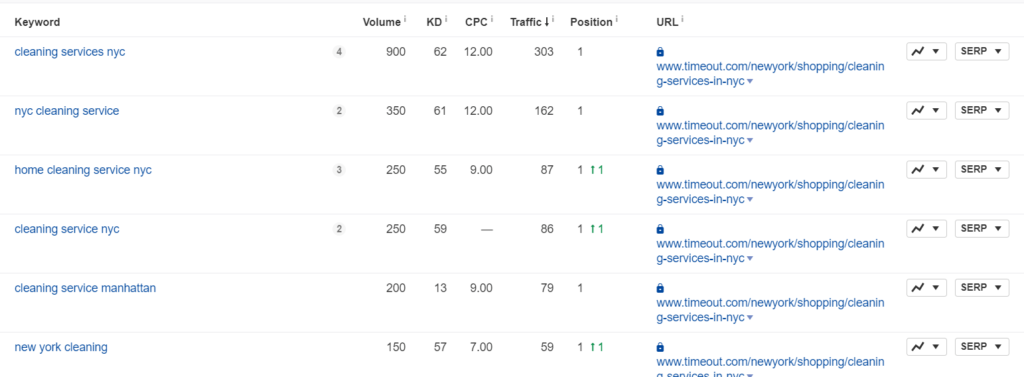This is the complete SEO guide to ranking local business websites.
Local SEO is a search engine optimization (SEO) technique that helps improve the visibility of businesses in local search results. If your business has a physical location or serves a geographic area, you can profit from local SEO. When users search for a service such as an ‘Italian restaurant’ or ‘vintage clothing’, Google will show local results and find the service nearby. By using local SEO in place, users can find quick and easy information for their business.
However, a local SEO campaign comes with some challenges which we will explain in our article. Read on to learn how you can master your local SEO strategy to benefit your business.
Google My Business – Ranking in Local SEO
To improve your business’s local ranking, you can use Google My Business to maintain and update your business information.
Certain types of queries will result in Google showing local results in maps and search. For example, if you try to look up for pizza delivery, Google will find nearby restaurants that deliver pizza.
To ensure that your business shows up on relevant searches in your area, you should make use of Google My Business. This will ensure your business information is accurate, complete, and enticing. To improve your ranking in local search, make sure you apply the following:
Complete all data
Businesses that have complete and accurate information are simpler to pair with the right searches. Google also considers freshness in the ranking, so make sure you keep your information updated as your business shifts. It is also crucial that you provide all the information possible. Users need to know where you are located, what service you provide and your opening hours. Some of the most important fields include your physical address, contact number, category, and attributes.
Confirm your location(s)
It is important that the physical address you provide is verified. Once its verified, you are more likely to appear in local search results and maps.
Reliable opening hours
Update your opening hours regularly so that users will know when you are available and avoid disappointments. Make sure that you also include special hours for holidays or events.
Give importance to reviews
Highly rated reviews from your customers can improve your business visibility. Users are also more likely to shop at your location if you are highly reviewed. It is also important to respond to your reviews. This will show that you value your customers and their feedback. Responding to negative reviews can help you also understand what can be improved.
Make use of photos
Photos of the services you offer can help customers confirm that your business has what they are looking for. Photos are also more appealing to users and help showcase your business portfolio.
At this stage we know how to increase our chances of showing in the right local search results. Let’s see what Google uses to determine the rank for local search results:
How does Google rank local results?
Local results are based on 3 factors: relevance, distance, and prominence. These are the 3 factors that are used together to rank local search results. The Relevance factor determines how relevant a local business profile matches what you queried for. The Distance factor considers the distance from the user’s location to each potential search result. The distance is gathered from their device’s location unless a location is specified. Lastly, Prominence factor refers to how popular a business is. Some places are more popular outside of the online world such as famous landmarks and institutions, or well-known brands. It also factors places that are highly ranked in normal search results.
The importance of keywords in local business websites
Traffic is driven to your website from specific types of keywords that are related to your niche and your location.
To be able to see which keywords you should use, look at your competitors who are ranking first in SERP results. Rather than spending hours performing keyword research, you can use Ahrefs to find out what your competitors are using for their top keywords.
Firstly, choose broad base terms such as keyword and city. In my example, I use ‘cleaning services New York’
A simple Google search can determine immediately which ones are ranking highly.

However, services like Ahrefs can give you an in-depth analysis of their top keywords as well as of other keywords they use. By looking at what keywords your competitors use, you can find out which keywords to look out for.
- Go to competitor analysis in Ahrefs.com
- Enter the keywords you enter in Google and look at the top competitors. Each competitor will have a top keyword but Ahrefs.com also gives you information on all the keywords they use.

- Clicking on the keywords count link, will present you with detailed information on each keyword that your competitor uses and details on the volume, traffic, position and more.

This will give you a good indication of which keywords to use to rank highly in your area. Notice how ‘nyc’ and ‘manhattan’ are both used as alternatives to ‘New York’.
You can also make use of free services such as Google Keyword Planner. They will give you keyword suggestions based on what you provide but it will not necessarily show you information directly from your competitors.
Write high-quality, long-form content to get more visitors
According to neilpatel.com, having content that is 3000 or more words long, can get you more traffic, more links, and more shares. Here is a chart he uses to demonstrate his results:

The more words you write, the more chance you have at ranking high. Even if you just run a local business, you can still blog about anything within your niche. As long as you have something valuable to say, you can write about it.
As neilpatel.com explains, content that has been shared a lot usually has the following 3 characteristics: It delves deep in the subject, covers the topic in detail, and focuses heavily on the target keywords.
Therefore, in the end, you need to aim for your content to be long-form and have all three factors.
Local Citations – how do they help local SEO?
Your local business can be cited online with your name, address, and phone number. This is called a local citation. Citations can be found on local business directories, on websites and apps and on social media platforms.
Citations are used to help users find their local businesses online. By having a citation, you not only provide information about your business directly in search results, but you also rank higher. Moreover, if you provide enough information of your business, you can even appear in Google maps snippet in search results.
A good citation must include the essential components – name, address, and phone number (NAP). It also needs to contain a link to their company’s website. However, Google suggests to fully complete all the elements. As mentioned previously, completing all the data will increase your chances of ranking higher.
Some elements include business categories, opening hours, driving directions, business description, photos, images, videos, payment form options and much more.
You can manage your local business easily to ensure data accuracy. You can either do this manually or automatically. In fact, you can enlist your business in multiple business directories automatically and sync data across them using a single service. Take a look at one of our latest articles describing different citation services you can use.
If you would rather do this manually, Moz has provided a shortcut of where to get citations here. Although there are hundreds of local citation sources, you may be only interested in the big players.
How to gain backlinks in Local SEO Websites
Backlinks will help you build your reputation and trust, and search engines will notice this. Being recommended by other websites and being mentioned in social media is highly factored in search engine algorithms.
However, gaining backlink to local SEO websites is not always a piece of cake. In fact, it is one of the hardest forms of link building. It is difficult because you need to ensure that the site that links you is also local and that their visitors are located in the area you are optimizing for.
But if you use the right approach, it is not impossible to achieve!
Local Press
A staggering 67% of people use their local paper for local news and trust it more than Facebook. Therefore, it’s a good idea to try to feature in your local newspapers. Research the type of content they cover and try to see if you can find a related section where you can feature. You could promote your business, create an event, or just add an article to create awareness.
A great tip is to add a press release about your local news. Include a link to your local landing page and send it to the editors of the local newspaper portal. There is a good chance that the editors will use your press release on their site – creating a backlink for you. Try to use meaningful words in the link anchor text rather than the company name itself. This will help Google understand what the link is about.
Sponsoring Local Business
Sponsoring a local business can help your business get recognition and in turn gain you a backlink to your local landing page. Sponsorship can range from displaying ads to adding a mention of their business or anything you deem fit. By showing support, you show that your business cares about the local economy.
Local business sites tend to have a low domain authority score because they are smaller sites and not always operate outside of their location. When looking for local businesses, try to find ones that have a Domain Authority of at least 30 or more.
Business Directories
Business directories can be big directories or niche/local directories.
Big directories such as Yellow pages or Yell.com, are famous and well-known directories but are not the best option for SEO link building. However, they do tend to have sections specialized for your area. Therefore, it’s still important to enlist your business here to add to your backlinks.
Niche directories, on the other hand, are sites that share information for businesses in a specific location. Try to find business directories that are locally based. These directories will help you gain backlinks to your local SEO website because they are already local SEO optimized, rank for local keywords and are trusted within your location.
Share local resources
You can gain backlinks by sharing local resources. Try to share information that is valuable to your local searches but also in line what you offer. You can create blog posts about events and things to do within your area.
To continue with our previous example of cleaning services, you could write a blog post about “20 events for cleaning fans in New York”. Include an internal link to your local landing page with optimized anchor text. Anyone reading the article has a call to action and search engines will perceive this as an in-depth topic (remember its part of 3 main factors of content writing).
Another idea is to find influencers or bloggers that can promote your article while gaining backlinks from local sites. For example, you can try to ask the event coordinators for the events you wrote about to mention your piece.
Conclusion
Here are the takeaways to keep in mind:
- Enlist yourself in citation business directories. Most importantly in Google My Business. Make sure all the data is completed and accurate.
- Write high-quality long-form content related to your local business.
- Target keywords that are local – apply competitor analysis as a shortcut to keyword research to see which local keywords to use.
- Gain backlinks from other local businesses using local business directories, sharing local resources, and sponsoring other businesses.
Considering that 50% of searches on mobile phones search locally for businesses, it’s very important to have a local SEO optimized website. Moreover, 78% of local-based searches on mobile devices end up in purchases made in the store. Applying these approaches will help you rank in your local area and ensure that users in your area find you easily.
The Complete SEO Guide To Ranking Local Business Websites – FAQ
– Does SEO really work?
Yes, SEO does work. The process of optimizing your site to load fast and high-quality content that is targeted for certain keywords increase your chances of ranking higher in search engine result pages.
– How long does SEO take to start working?
4-6 months. According to SEO firms that is the average time you will take to start seeing results. However, SEO results will continue to grow if you keep implementing a solid SEO strategy.
– How do I know if my Google business is verified?
- Log in to Google My Business.
- Select the business you want to verify.
- Click Verify Now.
- Select Email from the list of certification options.
- Go to your verification email, click the Verify button. Alternatively, you can type in the code from the email in your Google My Business dashboard.
– How does Google my business work?
Google My Business is a free service that lets you showcase your Business Profile and business websites on Google Search and Maps. Google MyBusiness allows you to connect with your customer, apply updates to profile and analyse how your customers engage with your business.
– Does Google My Business Help SEO?
Google My Business helps local business appear in the local 3-pack (Maps snippet) and aids in their website rank. Users are also able to see information directly from the search results including opening hours, driving directions, website and more.

